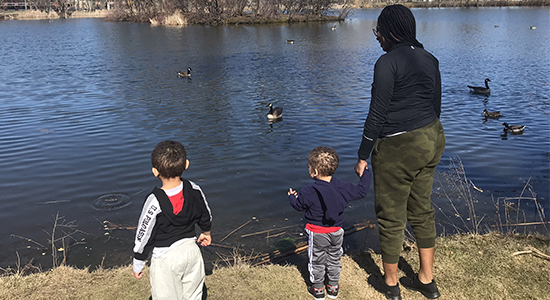
Madison attorney Julie Spoke takes early-morning runs each Friday with her 5-year-old English Shepherd, Sadie. “Beginning my day with a long run gives me a sense of accomplishment before my day even starts,” she says.
April 21, 2021 – Emily Stedman of Milwaukee is trying to read 21 books in 2021. Madison attorney Sam Wayne plays hockey when he gets the chance – and, over the past year, he’s relearned how to play chess. Julie Spoke goes running with her 5-year-old English Shepherd, Sadie. David Lasker of Mauston is writing a memoir. And Chinonso Osuji takes a change of scenery – from turning to face a window in the office to taking hikes outside.
All of these Wisconsin attorneys are doing the same thing: Taking time to attend to their own well-being. “Well-being isn’t limited to physical and mental health. There are many dimensions, including social, intellectual, emotional, and spiritual,” said Mary Spranger, manager of the State Bar of Wisconsin Lawyers Assistance Program, or WisLAP.
“It doesn’t matter what you do or how much time you take,” Spranger says. “It matters that you create that bit of space to take time for yourself.”
Well-Being Week In Law Is May 3-7, Well-being is Year-round
It’s such a necessary part of professional practice, in fact, that the Institute for Well-Being in Law has organized the Well-Being Week in Law – May 3 to May 7, 2021.
The idea is to remind lawyers to ask themselves, “Are you being mindful of your well-being?” said Jason Magill, State Bar WisLAP coordinator.
The institute is leading the way for a cultural shift in the legal profession that embraces health and well-being as the centerpieces of professional success. “Well-being isn’t just for so-called ‘troubled lawyers,’” according to Spranger. “It has relevance to all legal professionals. Being an advocate is hard work and can have detrimental effects on your mind, body, and spirit.
“We know that many lawyers and judges are suffering due to stress, anxiety, depression, compassion fatigue, and more. The well-being week is a reminder to include activities in your life that bring you fulfillment and restoration outside of work.”
And the past year has not been easy. “The pandemic has only amplified people’s work and life stress: our lives have been in flux, and many of us have dealt with real tragedy, grief, and loss as a result of the pandemic. This week is a good reminder to focus on health and healing,” Spranger said.
The idea, said Magill, is to ensure you are taking care of yourself, because you take care of others. Think of the instruction when you fly in an airplane to put your oxygen mask on yourself first. “It’s a cliché, but it points out that, since lawyers are in a helping profession, there’s a need to take care of yourself first, so you can take care of others to the best of your ability.”
“Of course, taking care of your own well-being is not just what you do one week out of the year,” Spranger said. “It’s the long-term, incremental changes that add up to enrich and balance your life.”

Chinonso Osuji takes a moment for a photo in May 2020 while hiking on Mount Bonnell in Austin, Texas – taking a break from her practice at Reinhart Boerner Van Deuren s.c., Milwaukee.
What If I Am Too Busy?
Focusing on self-care doesn’t necessarily mean a two-hour workout at the gym. Instead, consider where there is imbalance in your life – whether it is due to the demands of work, the pandemic and all the stress that brings, or something else. “There are many tools and practices to help you. Mindfulness, yoga, and jogging are all fine activities, but not everyone needs to pick the same activity to find value in self-care. Figuring out what works for you and what you like to do, no matter how small, can go a long way,” Spranger said.
Self-care isn’t just pampering yourself every so often. Self-care refers to the steps you can take to create a life for yourself that you don’t need to escape from. “For lawyers, there will clearly be times when work needs to come first. What I’d like you to consider, though, is that a lawyer’s needs can’t always come last,” Spranger said.
Between cases, for example, La Crosse County Judge Todd Bjerke stands up from his desk – at home, using Zoom video for court – and takes a short walk around his home to clear his mind. When he has more time, he takes long walks or a hike or bike ride before or after work. “As a result, I am sleeping better and am more productive at work,” Judge Bjerke said.
Start with a small goal, and let it grow into a habit.
– Julie Spoke, Madison
Milwaukee attorney Dereya Pedersen helps keep up her activity by always taking the stairs. “It may seem cornball cheesy and insignificant, but my step counter will tell you differently. Further, as a working mom, those little things make huge waves for my overall health and fitness,” Pedersen said. She also has used the pandemic as a signal to slow down. “I take lots of walks and explore my local parks and community with my children. I think far too often we go-go-go, but there’s simple joy in stopping to smell the roses.”
Part of well-being is having good work-life balance – with the emphasis on balance. “In reality, you can do things in smaller increments throughout your day – and the benefits really add up. The idea is to clear some things off the plate that are unhelpful and possibly hurtful or damaging to your day and overall well-being,” Magill said. “Then you can work in some time for self-care.”
Not everyone feels like they have time to sit down and read a book, says Jason Magill. “You might have time to watch a short video or listen to a podcast while you’re on the way home or going for a walk or run.”

Milwaukee attorney Dereya Pedersen spends time outdoors – here with the ducks at Washington Park in Milwaukee – with her sons, C.J., 2, and Oliver, 4, as a way to slow down. “It gave me the perspective that health is wealth, and that time spent with family is truly priceless,” she said.
Another Aspect: Your Work Environment
Here’s another consideration: How’s your firm culture? Are you in a position to change some of the practices that cause stress in your firm or workplace?
Alexander Lodge of Gurnee, Illinois, makes sure he is available for colleagues who need it. “When I see a colleague struggling, I find the best thing for me to do is to check in. This may be a text message, a phone call, or an invitation to grab coffee. I find it helpful to have a colleague that can be a sounding board when processing work stress or to share my own experiences managing the same.”
“Sometimes, if systems and processes can be improved so they are more supportive, the effect on workers is profound,” Spranger said. “If you are personally well but working in an atmosphere that feels unsupportive at best and toxic at worst, that’s going to take a toll on you. When firms recognize the value of healthy and happy employees, the culture tends to be better.”
Take One Moment to Participate in Well-Being Week In Law
How can you participate in Well-Being Week In Law? Participation can be as informal as checking in on lawyer friends and colleagues and trying to connect and catch up. “Throughout the pandemic many of us have felt socially isolated too and we’re missing connecting with our support systems,” Spranger said.
Another way: Take the first step to make a plan to put more fun and relaxation into your life. “Write out the first step toward achieving that goal,” Spranger said.
“Take time for a walk or to read a book or bird watch. What brings you joy? What helps you feel grounded and calm, that isn’t harmful to you? Do those things and you’re participating,” Magill said.
Well-Being Week In Law Is May 3-7, 2021
Too many lawyers and their support teams aren’t thriving. It’s time to take action. Well-Being Week In Law (WWIL) is one way to do so. You’re invited to join organizations across the legal profession to lead and participate in activities that promote health and happiness across the legal profession.
WWIL is a chance for you to refresh, reset, and reframe the way you see health and wellness in your life. We’ll share tips and resources on these topics:
- Monday: Stay Strong – Physical Well-Being
- Tuesday: Align – Spiritual Well-Being
- Wednesday: Engage & Grow – Occupational & Intellectual Well-Being
- Thursday: Connect – Social Well-Being
- Friday: Feel Well – Emotional Well-Being
Here are some resources to get you started:
Look for more information and insights in the May 5, 2021, issue of InsideTrack.
WisLAP is Confidential and Here to Help
Feeling overwhelmed? The Wisconsin Lawyers Assistance Program (WisLAP) is a member service of the State Bar of Wisconsin that provides free confidential assistance to lawyers, judges, law students, and their families in coping with substance use disorder, mental health challenges, or other stressors that negatively impact the quality of life and the practice of law. The program is designed to help members and their families build on their strengths and to provide support through services that promote physical, mental, and emotional health. It's never too late.
“We State Bar members are fortunate to have this fantastic, free and confidential assistance program, whose staff members are experienced, professional, and compassionate,” said Appleton attorney Jennifer Lee Edmondson, WisLAP volunteer.
WisLAP offers the following services:
- Initial assessment
- Referrals
- Peer assistance
- Consultation
- Education, including CLE programs
- Outreach
- Intervention
WisLAP 24-hour helpline: (800) 543-2625
WisLAP Manager: Mary Spranger (800) 444-9404, ext. 6159
WisLAP Coordinator: Jason Magill (800) 444-9404, ext. 6151
